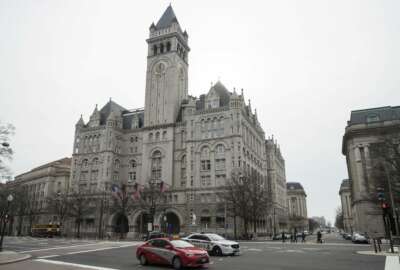
One proposal to keep electoral politics separate from federal real estate
Some members of Congress believe former President Donald Trump had a conflict of interest. As a private citizen, Trump had leased, from the General Services Adm...
Best listening experience is on Chrome, Firefox or Safari. Subscribe to Federal Drive’s daily audio interviews on Apple Podcasts or PodcastOne.
Some members of Congress believe former President Donald Trump had a conflict of interest. As a private citizen, Trump had leased, from the General Services Administration, the old Post Office Pavilion. It became a Trump Hotel. Now Representative Dina Titus (D-Nev.) has introduced a bill that would require the GSA to terminate any lease with an elected federal official or head of an executive agency. She spoke with the Federal Drive with Tom Temin.
Interview transcript:
Tom Temin: Tell us what your bill would require of the General Services Administration?
Dina Titus: Well, thank you for having me. Just a little bit of background, the GSA owns and oversees about 377 million square feet of space within 9,600 public buildings. In addition to that, they do something they called out leasing. Usually that’s a minor project like a Starbucks in a federal office building. But with the Old Post Office, they out leased the entire building, did a big remake and turned it into the Trump Hotel. Some of us felt like that was a violation of the Emoluments Clause of the Constitution. Because that says you’re not supposed to take things from foreign entities or other levels of government. Trump was both the tenant and the landlord. And so there was obviously a conflict of interest. But when we tried to get information about the books, who was staying there, how much they were paying, the GSA just shut us down. So that’s not supposed to be a political partisan agency, supposed to just be a neutral regulatory oversight agency. So this bill will ensure that that’s the case.
Tom Temin: And what about the future leases? In other words, it would terminate leases, but also prevent this type of leasing in the future?
Dina Titus: No, not necessarily. But it will provide more congressional oversight and require the GSA to bring those leases to Congress. Also, what it will prohibit, is any kind of foreign interest being engaged in those leases.
Tom Temin: Now, in the case of the Trump Hotel, I remember when that lease was signed, it was a 100 year lease with the Trump Organization. This was six, seven or eight years before Donald Trump became President Trump. And so I think there’s a provision then that upon becoming president, that lease would terminate.
Dina Titus: That’s right, it will prohibit any kind of leases with the president, vice president, member of Congress, or head of an executive agency. I believe that’s already backed in the Emoluments Clause. But that’s something that the courts just wouldn’t really interpret in several cases that were brought. So this states it explicitly.
Tom Temin: Right. Are you aware of any other instances of where this has come up at all?
Dina Titus: Not really, nobody in government has kept a lease like this. And most things are put into blind trust. And this was just run or owned or operated by some of the family. And so it was obviously a conflict of interest. You had lobbyists stay in there. You had foreign dignitaries stay in there. You had the Republican Party doing events there. So obviously, there was some attempt to curry favor with the president by putting money into his operation.
Tom Temin: Well, maybe it’s because it had the best bacon you could get anywhere in Washington. I don’t know.
Dina Titus: I don’t know either. I never ate there.
Tom Temin: We’re speaking with Democrat Dina Titus, who represents Nevada’s first district. And do you have any other support for this bill, even from any Republicans by any chance?
Dina Titus: Well, we’ll see if any Republicans sign on to it. This was a topic that we discussed at length within the subcommittee that I chair, which is part of infrastructure and transportation. The chairman, Mr. DeFazio has signed on to this bill with me. And he was pursuing this issue long before I got here. And so we went through about 24,000 pages of records to come up with a report on it. So this is not some fly by night thing. This has been a long time in the making, and based on a lot of facts and figures.
Tom Temin: Sure. Anything in the Senate at all at this point?
Dina Titus: No. The Oversight Committee, in addition to my committee looked into the issue. So I’m sure we’ll get support from the members of that committee, at least on the Democratic side.
Tom Temin: All right. I want us to switch gears if I may while we have you for just a moment. You have asked Interior Secretary Deb Haaland to stop the mustang roundups. And apparently there’s been some serious issues with the burros and the mustangs under the control of the Bureau of Land Management, including in Nevada.
Dina Titus: Oh, yes, especially in Nevada. We have the most wild horses of any state in the country. And they’re such an iconic symbol of the Wild West. You don’t have to be from the West to appreciate them. The folks who support my efforts come from all over the world, in fact, not just all over the country because there’s such majestic creatures. And the BLM has done a dismal job of trying to manage these herds, and they do need to be managed because if they just keep reproducing, they’ll starve to death or they’ll die of thirst because there just aren’t that many resources on public lands. Now the cowboys hate them, or the ranchers because they want their cows to get the water and the grass out there on public lands and see the horses as a pest. But the public certainly is supportive.
Now, there are a couple of areas that are problems. One is the roundups themselves, they use helicopters. There are about three companies that have had all the contracts with helicopters, and they make a lot of money that comes right out of the taxpayer’s pocket. Also, it’s just a cruel process, they just run the horses down scare them to death. There was a recent incident that was on national TV of a little colt that they ran down, it crippled it and they had to shoot it. So that’s a problem. Now the third problem that has arisen is they put all these horses in very close, small, contained spaces, once they round them up. So they get diseases that are quickly passed from one to another. And we’ve seen just recently, about 150 Horses die in several pens from respiratory ailments. So I would want to look into this. I wrote the Secretary to stop the roundups until they can figure how to do them better, and how to better manage the horses. Oh, let me add a fourth problem shows you how bad this is. They had an adoption program at the BLM. They gave you $1,000 to take the horse, and then they didn’t follow up. And a lot of people were getting the money and then selling the horse for consumption across the border. It is just a nightmare. And so we need better management. And I think we need to focus on birth control as opposed to just putting these horses in these pens.
Tom Temin: Yeah, the National Park Service manages some of the bison herds out west. And they do regular culling, as you say, to prevent the same problem of overpopulation and starvation and so forth. And they can become a pest if you let them. Maybe there’s some National Park Service aught to collaborate with the Bureau of Land Management on how to manage herds.
Dina Titus: Well, that’s a good idea. I’ll reach out to them because the BLM certainly has done a terrible job and they are in the pocket of the ranchers it appears because they don’t seem to want to help in this case, you know, only a very small percentage of the money that we give to BLM for management has been used for birth control. And listen to this interesting story. They have used drones for round ups, because a horse will follow a drone, then you don’t have to chase the horse. You don’t have to scare it to death. But you can leave it to someplace where you want it to go. Wouldn’t that be more humane? Plus, I say hire some more cowboys. They know how to round up horses. So this is an employment bill but some of those cowboys do work and get out of the helicopter.
Tom Temin: Yeah, get some of those casino workers maybe and retrained as a round up folks.
Dina Titus: Well, everybody’s talking about workforce development. This may be something to look into.
Copyright © 2024 Federal News Network. All rights reserved. This website is not intended for users located within the European Economic Area.
Tom Temin is host of the Federal Drive and has been providing insight on federal technology and management issues for more than 30 years.
Follow @tteminWFED





